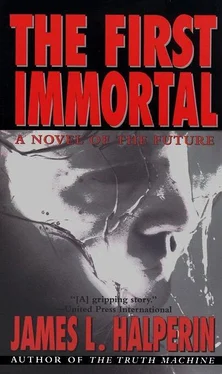“That is how a nation prevails against a ruthless enemy, be that enemy the Axis powers or Death itself. The choice, gentlemen, is simple: World War Two, or Vietnam. Share immortality, or brace yourselves to wage this War Against Death, the most overwhelming enemy in the history of humankind, with only halfhearted cooperation on your own side.”
As I listened to Dad’s summation, I winced. Not strong enough. He’d have to terrify these clowns to convert their votes. I even considered e-mailing him via wristband PC, but decided the transmission wouldn’t be listened to in time.
Nine Republicans and one other Democrat had already spoken today, and eighteen more senators would address the floor before S. 1122, the Cryonics Regulations Bill, was amended and voted upon. So far, the Republicans had simply ignored the Democrats.
President Roswell’s “pet senator,” Lawrence Bayless (R. TX), had argued convincingly to require that suspendees deposit all money not bequeathed to their survivors into a U.S. Government Inflation Neutralization Account (INA). Such a program would safeguard (though not increase) every suspendee’s wealth, while providing a bonanza of low interest loans to the government. Projected taxpayer savings: at least $2 trillion over the next ten years.
Senator Thomas Hollandsworth (R. CA) had suggested the recognition of four categories of the “nonliving,” listed here in reverse order of status: (1) The irrevocably dead, that is, cremated, lost at sea, et al. (2) Persons frozen or otherwise DNA-preserved, but with hopelessly irreparable brain damage. (3) Persons frozen after death with brain tissue arguably saved. (4) Persons in suspended animation, frozen prior to death and any material brain decay.
The legal implications would be staggeringly complex, and such categories would no doubt occasion countless lawsuits over their designation.
God, I hated the guy, but he did seem the perfect person to draft these regulations. I quelled a laugh. “Hollandsworth’s so anal,” I’d once overheard Dad tell my great-uncle Gary, “you couldn’t get a pencil up his ass with a pile driver.” He’d have been upset to know I heard him use such language, and especially that I’d bugged his digital communicator, but naturally I thought it hilarious.
Earl Churchman (R. NE) argued on behalf of the insurance industry, a strong supporter of S. 1122. Insurance executives were already salivating over the banquet they were about to attend. After the bill passed, a typical suspension and indefinite maintenance contract was projected to cost only $34,000 per person, barely one month’s average American household income. Nonetheless, about eighty-five percent of those intending to sign up for the dormantory expected to fund this contract through a “cryonics all-contingency” policy. Most also planned to purchase “death or suspension” insurance with their INA accounts as beneficiary.
Churchman asserted that a government reinsurance agency, similar to the FDIC and FSLIC. would be the most effective instrument to infuse financial confidence into the cryonics system.
Finally Clarissa Westervelt (R. MI) addressed population and environmental issues: “My husband and I have been married for twenty-three years, and our original plan was to have three children. So far, we have only one; yesterday was her seventeenth birthday.
“But we intend to produce at least two additional offspring.
“After the turn of the millennium Glen and I decided that instead of raising two more children at that time, we would save our money, and use it to dispatch our own DNA into the next century. And along with our DNA, we agreed to send as many of our memories as we could salvage, preserved in our own frozen brains.”
I found her metaphor both intriguing and comforting, but such comfort would be short-lived.
“Some of you,” Westervelt continued, “might laud this restraint of our breeding instincts, while others may deem us selfish for having deprived the world of new life. Opinions about population growth remain diverse.
“I am an optimist. I believe technology’s ability to help us sustain population growth is advancing faster than world population itself. New farming disciplines are revolutionizing agriculture, while energy and transportation steadily decrease in cost. And the sciences of oceanic husbandry are perhaps the most promising of all. By breeding fish and other sea organisms using the latest techniques, undersea farming experts insist we can quintuple our annual harvest from the oceans within six years.
“But wealth is not merely about material goods; it is about life itself.
“A person earning $100,000 per year, that is, just below today’s official poverty level, can expect to attain seventy-nine years. A person who earns $1 million, roughly two and one-half times the average worker’s income in 2015, has an average life expectancy of ninety-six years. A $10 million wage earner will, on average, see the far side of a century.”
She stared at Dad, addressing her next observation to him, as if lecturing a child. “With or without cryonics, Senator Crane, money buys survival. Always has. Always will.”
My initial anger dissipated as I saw determination ignite behind Dad’s eyes. Westervelt’s speech had awakened my father, and perhaps the entire Democratic party.
“Citizens must,” she proceeded, “through labor and prudence, provide themselves and their families the means to sustain their own lives. And if these same citizens are willing and able to provide such means to others through voluntary charity, I admire them for it. But I will not betray my constituents by voting for any legislation that requires them, through involuntary taxation, to diminish their own odds by paying for others to be frozen.”
Westervelt’s oration continued for nineteen minutes more, after which the Minority Leader was permitted to respond on behalf of the Democratic senators. I hoped Dad would now tender their most forceful inducement: enlightened self-interest.
“Contrary to popular opinion,” he began, “even we liberals believe that property rights are important. But the crux here is not wealth redistribution. This argument does not wrangle between provision for the poor versus the sanctity of individual achievement. And while consequential, neither is morality today’s primary topic.
“Our current state of affairs has all the makings of a genuine emergency. And in an emergency, all bets are off!”
Yes! I celebrated. Now we had a shot.
“Do I overstate my case? Consider this: If you are drowning, doesn’t the issue of ownership of any fresh air above you become meaningless? Wouldn’t you fight, and rightly so, to breathe it?”
“Perfect,” I said to Grandmother, not quite whispering. Impolite, but what could she expect?
She smiled warmly at my over-enthusiasm, in spite of herself.
“We stand here today,” Dad continued, “full of hope as we witness the dawn of a new paradigm. Taxes may be inevitable, but Death, that other prehistoric absolute, is no longer certain.
“Do you wish to act in your own self-interest? Then let us make this truly new world available to all. If we don’t, many more lives will certainly be lost, forever, to those clawing past us to breathe the sweet air of permanent life.
“No matter your politics, no matter your religion or creed, understand now the certainty of the conflict we face. The drowning man is no thin or artful metaphor; he is an exact allegory. We’re all drowning. And yet there’s plenty of air for all of us in the peaceful sharing of it. By voting your pocket-of-today, you squander your fortune tomorrow. Let us make victory against death a prospect for all, lest it become a prospect for none.”
* * *
Later that day, when the Senate was polled on individual components of the enactment-bound S. 1122, the only tie vote was on the issue of government subsidization of cryonics for the poor. Even conservative senators such as Juanita “Chacha” Guerrero (R. PR) voted for the subsidy. Dad’s rebuttal had converted the contest from hopeless to too-close-to-call.
Читать дальше












